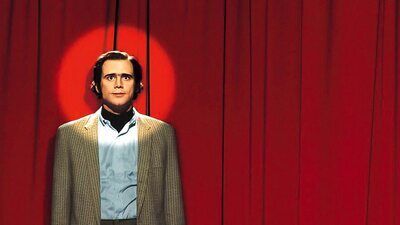Indeed, while his life and death are on display, there’s a refreshing neutrality to the presentation. Some scenes, you may find Kaufman to be a brave comedic anarchist setting fire to the banality of network sitcoms. Other times, you may think he’s just a jerk indulging his odd sense of humor in order to torture his fans. Your mileage will vary as an audience member, and 25 years later, I think that’s what makes this such a standout biopic. “Man on the Moon” loves Kaufman, but even it can’t entirely make up its mind about him. That’s not a weakness but, rather, a strength, leaving room for viewers to filter his life through our perspective.
Plus, the world itself has changed since this film’s initial release. In the late 1990s, selling out was still an artistic sin, with Kaufman held up as one of the champions of Never Compromising. But despite our modern entertainment landscape full of anti-comedy and niche performers, that attitude has mostly faded away—artists have learned to embrace their corporate masters. Is Kaufman a symbol of an honorable, forgotten mindset? Or was he just a pain in the ass, selfishly amusing himself? I lean toward the former while acknowledging the times that he veered toward the latter. “Man on the Moon” spotlights both sides—no judgments and no conclusions.
The further away we move from his death, the more enigmatic Andy Kaufman becomes. And the better his movie plays. Too many biopics want to assure us that they have all the answers—that an amazing life can be summed up in a few hours, leaving us with all the correct positive emotions as we exit the theater. “Man on the Moon” is suspicious of such niceties. So much of Kaufman’s prankish work was about misdirection, false appearances, elaborate schemes—why shouldn’t his film be equally self-aware about the limits of a “true” portrait of an artist? This movie won’t tell you what made Andy Kaufman tick, but it understands what he meant. Forget phony insights and fake uplift: Ultimately, that’s all I need from a biopic.

